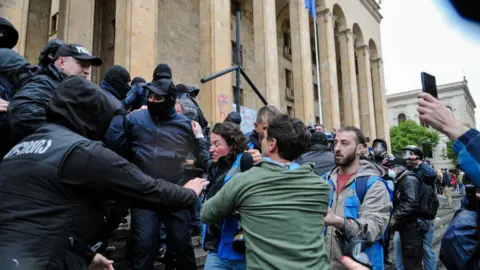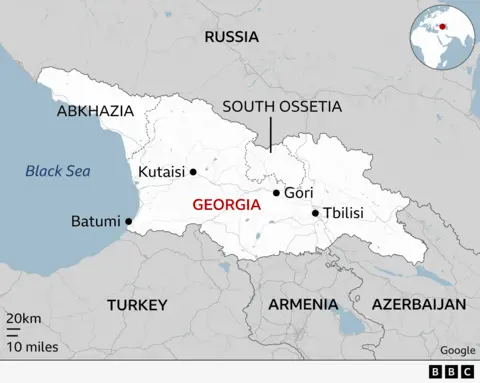Georgia’s pro-Western president has appealed to the international community to stand behind her country’s population after a disputed election that she says was “totally falsified”.
Salome Zourabichivili, who has sided with the opposition, has called Georgians out on the streets on Monday, telling the BBC’s Steve Rosenberg that this is a “crucial moment”.
The ruling Georgian Dream party and the election commission are adamant the result, giving the government almost 54% of the vote, was free and fair.
However, Zourabichvili urged Georgia’s partners needed to see what was happening, adding that the government’s victory was “not the will of the Georgian people” who wanted to keep their European future.
Zourabichvili made clear the protest would be “very peaceful”, adding that she did not believe Georgia’s authorities wanted confrontation.
It is not entirely clear what she and the four opposition groups hope to achieve by bringing Georgians on to the main avenue in front of the parliament on Monday, but she said it was up to the people and the political parties to decide what happened next.
“My call was to have a demonstration but where does the Georgian population stand? It’s what we’re going to see tonight.”
“Maybe we won’t be able to achieve it today or tomorrow,” she said. “There are a number of things that can be done. There can be an international review of some of the elements of the election, there can be a call for new elections. In what period of time I don’t know.”
The European Union, Nato and the US have called for a full investigation into allegations by monitoring missions of vote fraud before and on the day of Saturday’s vote.
The call for protest echoes weeks of demonstrations that brought Tbilisi’s central Rustaveli Avenue to a standstill for weeks earlier this year.
 Getty Images
Getty ImagesThere were clashes with riot police, who responded with water cannon, tear gas and force, as Georgians tried to stop the government pushing through a Russian-style “foreign agents” law targeting media and civil society groups that have foreign funding.
Ultimately the protests failed and the EU froze Georgia’s bid to join the 27-country union, accusing it of democratic backsliding.
The government has clearly prepared for further protests. Last week it emerged that the interior minister had bought new water cannon vehicles and other equipment for riot police, including lethal weapons, for use “when it becomes necessary”.
Georgian Dream Prime Minister Irakli Kobakhidze has told the BBC that alleged violations ahead and during the vote were confined to “just a couple” of polling stations. He said that “the general content of the elections was in line with legal principles and the principle of democratic elections.”
But President Zourabichvili said the scale of election fraud was unprecedented: “Everything was used that we’ve ever heard of in this country in a parallel way.”
She alleged that, before the elections, families who were dependent on state funds had seen their identity cards taken away.
At the time it was difficult to tell why, she said, but it then became clear the identity cards were being used for so-called carousel voting in Georgia’s new electronic voting system – “when one person can vote 10, 15, 17 times with the same ID”.
She has also described the result of the vote as a “Russian special operation”, stopping short of accusing the Kremlin of direct intervention. Instead, she accused the government of using a “very sophisticated” Russian-inspired propaganda strategy.
The government has vehemently denied having anything to do with Russia, pointing out it is the only country in the region not to have diplomatic ties with Moscow.
Russia fought a five-day war with its southern neighbour in 2008 and still occupies 20% of Georgian territory.
The Kremlin has has denied having anything to with the election and ridiculed Georgia’s pro-EU president, whose term in office comes to an end in December.

A handful of international leaders have congratulated Georgian Dream for securing a fourth term in office in the contested election, including Hungary’s prime minister, Viktor Orban.
Orban was due to arrive in Tbilisi on Monday on a two-day visit that has annoyed several of his European partners because of the message it sends the Georgian government.
Germany’s foreign ministry spokesman said the Hungarian leader could travel where he wanted, although it was clear he was not speaking on behalf of the EU.
Hungary currently holds the presidency of the EU, but foreign policy chief Josep Borrell stressed that it had “no authority in foreign policy”.
“Whatever Mr Orban says in his visit to Georgia, he does not represent the European Union,” Borrell told Spanish radio.

